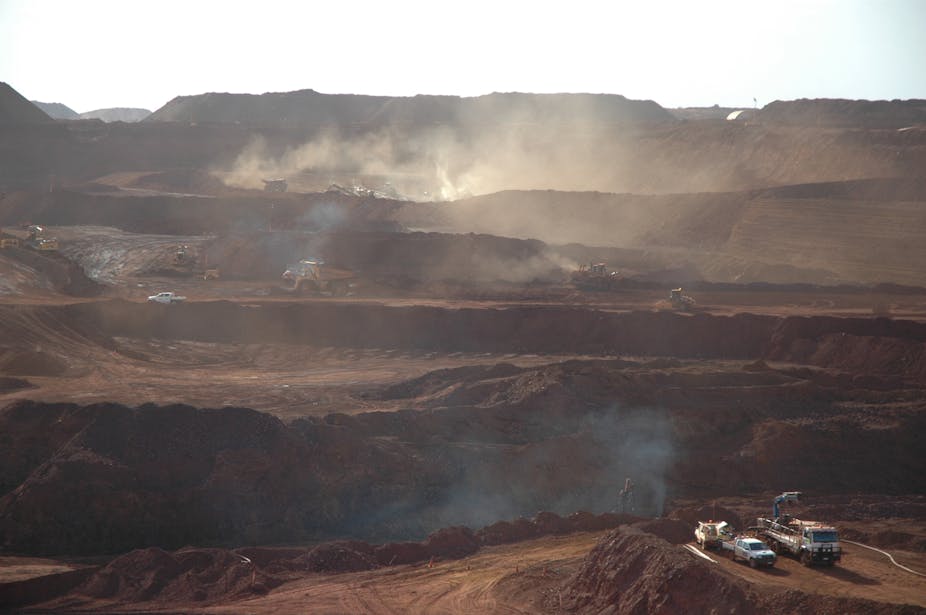It’s a far-from-perfect instrument of global governance. But as the Extractive Industries Transparency Initiative (EITI) coalition celebrates its 12th birthday, it can point to steadily increasing membership and dialogue between countries, mining companies and NGOs.
Regrettably, Australia, with one of the world’s largest mining economies, has still not committed to joining the 48 other nations working on EITI disclosure. This is despite the obvious benefits that greater transparency could deliver to all Australians as they confront deep-seated disputes about mining revenues, taxation, royalties and land use.
With the looming deadline of the Brisbane G20 meeting, the Abbott government is considering a “hybrid” model of EITI implementation. This may – or may not – satisfy the stringent disclosure standards imposed by the global transparency movement.
How does the EITI work?
Transparency EITI-style involves a simple game of show-and-tell. In each country, private sector “extractive” industries (producers of oil, gas and minerals) voluntarily disclose their payments to governments. Governments reveal the taxes they have received from those companies. An external independent auditor validates and reconciles the two sets of numbers before they are published.
The EITI data gives the public an official glimpse of actual revenue flows from local resource projects. This is information that, in many cases, has never been made public before. Any inconsistencies between the two sets of data point to lax administration or perhaps corrupt skimming of resources.
The particular strength of the EITI model is the involvement of civil society as a full player, alongside governments and mining companies, in each country’s Multi-Stakeholder Group (MSG), which oversees EITI implementation.
Success stories
EITI was the brainchild of then-British prime minister Tony Blair. It was launched in 2002 as a new tool to help tackle the “resource curse”: the phenomenon of resource-rich societies that actually become poorer, more unstable and more corrupt as mining extraction takes place. Revenue transparency would, it was hoped, provide civil society with the financial data previously concealed within corporate boardrooms and government treasuries.
Since then, 31 countries have started publishing annual “compliant” EITI reports. Another 17 countries are “candidates”, trialling the process and awaiting formal compliance status granted by the EITI board.

One of EITI’s biggest success stories is Liberia. The tiny poor West African country, scene of a horrible 15-year civil war and now struggling against the devastation of Ebola, is an EITI giant. One of the first compliant countries in the world, Liberia has completed five successive years of EITI reporting. The latest round involved 80 companies disclosing payments of more than $US100 million.
EITI in Liberia has strengthened civil society, embedded transparency in the legal system, exposed improper awarding of contracts and used innovative infographics to combat illiteracy and promote wide public understanding of resource revenues.
Australia lags behind
This month’s EITI board meeting in Myanmar accepted Chad and Indonesia as compliant. The UK was accepted as a “candidate”. Its involvement is a watershed, as EITI membership now extends beyond the developing “south” to include the developed “north” alongside Norway and the United States.
However, Australia is lagging. When the Gillard government announced in 2011 that Australia would conduct an EITI “pilot”, this was greeted as a likely prelude to full implementation. But that pilot has only just been completed.

During the past three years, EITI standards have become more stringent while Australian enthusiasm seems to have cooled.
The pilot was conducted under an MSG convened by the Department of Industry and with representatives of federal and state governments, major mining companies and civil society organisations. The MSG meetings were confidential, save for a grandly titled “communique” issued after each gathering.
The final communique, issued in February 2014, revealed what appears to be a convenient compromise. The MSG recommended Australia adopt a “hybrid” model: company payments would not be annually reconciled but would be subject to spot checking in a “statistically valid sample”.
Will a ‘hybrid’ model compromise the EITI?
The MSG hopes this will be acceptable under EITI rules, though this is not certain. The hybrid concept seems driven by confidence that Australia’s financial and governance arrangements are already so robust that further reporting would be unnecessary.
And, of course, as an Industry Department spokesman reminded me, “the Australian government remains committed to reducing the burden of regulation on Australian businesses”, as well as to open and transparent government.
A local coalition of NGOs under the banner Publish What You Pay has called on the government to “show leadership on extractive industry transparency” by committing to implement EITI.
One member of Australia’s MSG, Oxfam’s Serena Lilywhite, said Australian candidacy of EITI would:
… not only send a strong signal to other governments that it is serious about transparency and accountability in the extractive industries, but it would also be better placed to assist with implementation by our neighbours in the Asia-Pacific.
Beyond these foreign policy goals, Australian implementation would deliver significant domestic benefits. Another MSG member, CAER’s Julia Leske, said:
Full implementation would help Australians better understand how we benefit from the extraction of our finite natural resources.
Leske did not spell it out, but this point merits underlining. As the spat between Western Australian Premier Colin Barnett and mining giants BHP Billiton and Rio Tinto shows, disputes about the “right” levels of production, cost and taxation of mineral commodities are not confined to developing economies.
Many such issues confront Australian policy and politics. These include the Rudd government’s failed minerals “super tax”; the allegedly corrupt dealings in relation to Hunter Valley coal mines; WA’s “royalties for regions” program and its claims of unfair distribution of GST revenues; and land use disputes between farmers and coal seam gas producers.
Transparent disclosure of mining revenues and taxation receipts would greatly improve public debate on such issues.

